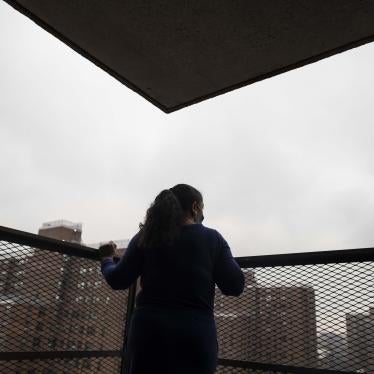For years, the Bush administration in the United States has stood by the government of President Álvaro Uribe in Colombia unconditionally, turning a blind eye to Colombia’s serious human rights problems. The Blair government in the UK, for the most part, quietly followed suit, providing substantial assistance to Colombia’s military with no strings attached. It’s time to rethink that policy.
Colombia presents one of the worst human rights records in the world. At nearly three million, Colombia’s population of internally displaced persons is second only to that of Sudan. Colombia also has the worst record in the world in terms of assassinations of trade unionists, with over 2,500 being killed in the last 20 years—more than 400 during the Uribe government. Journalists and human rights defenders live in fear they will be threatened or killed for simply doing their jobs.
Drug-running paramilitary death squads are responsible for widespread massacres, selective killings, and forced takings of land from civilians. They have often engaged in these crimes with the acquiescence, and sometimes, even active collaboration of military units. Scores of civilians languish for years as hostages of the left-wing guerrillas of the FARC guerrillas, who like those of the ELN, are notorious for their use of child soldiers and antipersonnel landmines, with total disregard for the laws of war.
The Bush and Uribe governments cite as evidence of progress official statistics showing a drop in kidnappings and massacres. However, a more disturbing reality hides beneath the statistics and rhetoric. It’s true that there has been a reduction in some abuses, in part because the government has aggressively pursued the FARC. But when it comes to abuses by right-wing paramilitaries and the military, the government’s approach has been very different.
As documented by the UN High Commissioner for Human Rights, in recent years there has been a sharp increase in reports of extrajudicial executions of civilians by the army. In several cases, members of the military have allegedly killed civilians and then dressed them up as guerrillas killed in combat, apparently to boost the military’s body count. When human rights defenders have reported these abuses, Uribe administration officials have accused them of being tools of the guerrillas.
Since 2002, the government has been engaged in a “peace process” started by paramilitary commanders seeking protection from extradition to the United States on drug charges. Thus, the government has repeatedly proposed initiatives favoring commanders’ interests in avoiding accountability, keeping their wealth, and hiding the truth about long-standing links to the military, the business sector, and politicians.
In fact, the Uribe administration is now embroiled in a growing scandal over links between high-ranking government officials and paramilitaries. Uribe’s former intelligence chief, Jorge Noguera, has come under prosecution for allegedly collaborating with paramilitaries. The allegations are serious enough that the US has revoked Noguera’s visa. More than 40 congressmen from Uribe’s coalition, including his close political ally and cousin, Senator Mario Uribe, are under investigation for similar links. Rather than fully support the investigations, Uribe has repeatedly lashed out against the judges and journalists who are bravely trying to break paramilitaries’ influence.
Fortunately, the climate of opinion in Washington towards Colombia has been shifting since Democrats took control of the Hill. Last year, they froze a portion of military aid to Colombia due to military abuses. The Congress has even suspended consideration of the US-Colombia Free Trade Agreement until Colombia shows concrete and sustained results in improving the human rights situation.
The Bush administration’s policy towards Colombia has been largely determined by its fear of Hugo Chavez in neighboring Venezuela. As a result, it has subordinated human rights concerns to what it considers a strategic partnership with Colombia. But this policy has only damaged US credibility in the region.
The new leadership of the US Congress has understood that the best way to help Colombia and strengthen US credibility is not through unconditional support for one government’s policies. Instead, it is through intelligent support, grounded on human rights principles and conditioned on real improvements.
The UK, too, should rethink its policy towards Colombia, lest it be left behind, saddled with Bush’s unprincipled policy.
** José Miguel Vivanco is the Americas Director at Human Rights Watch; Maria McFarland Sánchez-Moreno is the Senior Researcher on Colombia at the same organization.







